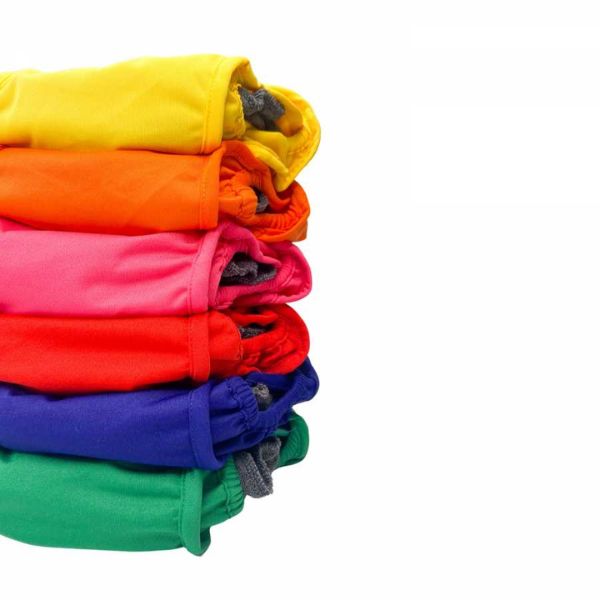Brits reveal their top ten parenting concerns
With the baby boom from the pandemic continuing through 2022, expectant and new parents are Googling their top concerns about their youngsters. Being a new parent can be daunting, so it’s natural to search your concerns to see if others struggle with the same issues and what advice is out there.
With this in mind, eco nappy brand The Nappy Gurus reveals the UK's current top ten parenting concerns in 2022. Topping the list is ‘vaccines for your baby’, with the search term ‘mandatory vaccines for babies UK’ racking up a staggering 38,900% increase in interest in the past 12 months¹.
According to Google Trends insight¹, The Nappy Gurus have ranked the top ten parenting concerns among Brits and share advice on how to combat these issues:
1. ‘Mandatory vaccines for babies UK’ - (+38,900%)
Over the past 12 months, the search terms ‘what happens if vaccination is delayed for baby UK’ and ‘mandatory vaccines for babies UK’ have both seen huge uplifts in parents searching for advice.
In the UK, the recommended vaccinations include the Rotavirus vaccine, the 6 in 1 vaccine, the Pneumococcal vaccine, and the MenB². These vaccines are usually offered by the NHS.
The longer your baby is without their vaccines, the higher the risk of illnesses and diseases. If you’ve missed your baby's vaccination accidentally, you can simply rebook it. However, suppose you are unsure about whether to vaccinate your baby. In that case, it’s recommended to talk to a medical professional about any concerns.
2. ‘Why won't my newborn fall asleep?’- (+ 13,900%)
Newborns' sleep schedules will never be easy or reliable. Whilst nap times can vary, some tips you can use to try and get your baby to sleep at night time include keeping the lights down low, playing a soothing playlist and keeping your voice quiet to create a calm environment for your baby.
3. ‘Struggling to stop breastfeeding’ - (+1000%)
When both you and your baby are ready to move onto the next stage of feeding, experts recommend a gradual phasing out of feeds. If you notice your baby becoming irritable with this change, it’s helpful to create distractions, such as cuddling and comforting your baby.
4. ‘Why is my baby so aggressive?’ - (+900%)
When a baby displays aggression, it’s usually out of pain, discomfort or frustration, and they simply need to be calmed down. Experts say ways to calm your baby include stroking their back firmly, holding them against you, or laying them face down on your lap.
5. ‘Shy baby’ - (+200%)
It’s common for a baby to cling to its parent or prime caretaker in social settings. If you want your baby to become more comfortable with others, it’s essential not to rush them and give them time to feel comfortable, staying close by so that they feel safe. A great way to make your baby feel secure is to use baby carriers, they can help babies form a more interactive approach with the world around them, whilst providing a sense of comfort and security.
We love the Ergobaby carrier for newborns, the soft wide straps help provide excellent support and comfort level and it is quick and easy to use unaided.
As your infant gets older we recommend the Tula Baby carriers- the Tula Explore in particular as it enables both facing in and out carry, which gives you a great range of options, while remaining super comfortable to wear.
6. ‘Why is my baby crying so much?’ - (+136%)
Crying babies are normal, but it can become worrying if it’s persistent. The first thing to do if your baby is crying more than usual is to check its temperature, which may result in you needing to call your GP, experts say. Common reasons for babies crying more than usual include teething, nappy needing changing, hunger or tiredness.
7. ‘Breastfeeding struggles’ - (+100%)
Breastfeeding is a topic that many mothers struggle with. With the term ‘breastfeeding struggles’ increasing in interest by 100% over the past 12 months¹, it’s clear that the worries which come with breastfeeding are not going away. Common breastfeeding struggles include cracked or sore nipples, your baby not latching on properly, and not having enough breast milk. If you’re concerned about your breastfeeding struggles, you can ask for help from your midwife, health visitor or breastfeeding specialist.
8.‘Newborn pee and poop chart’ - (+88%)
When your baby is a newborn, the colour of its pee and poo can vary. Newborn poo can be green, black and even yellow - so how do you know what’s healthy and what it means? Your baby's poo can change colour according to the diet you provide. Whether you feed them breast milk or formula can change the colour from light brown to a darker brown.
9. ‘Average baby weight at birth UK’ - (+84%)
The average baby weight at birth in the UK is 7.5lbs. However, baby weight at birth does vary with each baby and can depend on many factors such as the date the baby is born in comparison with their due date, the weight of the mother and the gender of the baby.
10. ‘How many dirty nappies newborn’ - (+52%)
A newborn baby will need on average 10-12 nappy changes every day, which can be expensive and damaging to the environment if using disposable nappies. It’s recommended to use reusable nappies from birth if you’d like to reduce the impact you’re having on the environment, cost of nappies, and the waste generated.
Communicate concerns with others
We think it’s so important for parents to share their concerns and discuss them with others. Many parents and carers are going through the same struggles. You're not alone.
Luckily for parents, there are now many online resources to help calm any nerves and settle any anxiety about different topics of motherhood - such as our team of Nappy Gurus! No parent is alone in their struggles, and we hope parents keep helping one another or going to a specialist for advice, especially during the early years of parenthood.
For more parenting tips and advice, please visit our blog.


